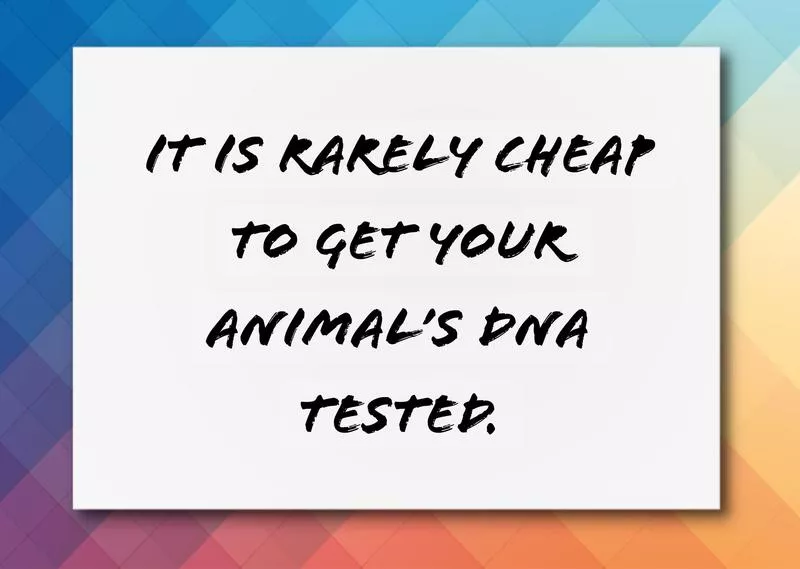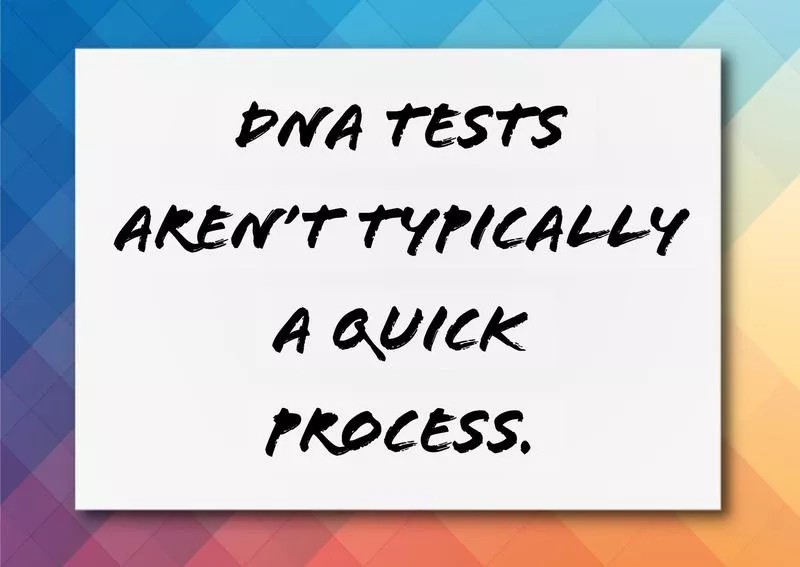Until recently, your animal’s genetic makeup was something you simply believed if someone else told you, or you left it as an unsolvable mystery. But thanks to the marvels of modern science, a simple cheek swab and a small fee can unravel the mysterious makeup of your animal bestie.
But, before you simply buy the first DNA test you see and send it off hoping to get all the questions you’ve ever had about your pet answered, there are some factors to keep in mind. While there are certainly benefits to conducting an animal DNA test, there are lots of extenuating circumstances around the experience that you should consider.
So, here’s a list of some things to keep either at the forefront or at the back of your mind as to whether or not you should DNA test your pet.
The Cost

Though the prices for your pet DNA test will vary based on the pet and which test you ultimately end up choosing, it is rarely cheap to get your animal’s DNA tested.
And that’s understandable considering all the high-tech science that goes into getting the results. Be sure to do your research before choosing a test, as the most expensive test may not be the most necessary for your interest level or even the most accurate.
The Options

The best DNA test for your dog may not be the same for your cat, so make sure to do your research. Since animal DNA testing has been around for a while now, there are plenty of reviews you can turn to for answers before, you know, you get your answers.
Some DNA tests may be cheaper and faster but could lack overall accuracy, while others may take a lot longer but promise more precise results and ongoing updates. Like any purchase for your furry friend, do your due diligence to make sure everyone will be happiest with the results.
The Collection

DNA tests use existing collections of animal DNA to better understand your personal critter’s chemical makeup. Some of the most popular tests, because so many people use them, may have the largest data pool from which to pull.
But, because testing your pet is gaining in interest and in popularity, new products could enter the market with other information databases that could be even more helpful for your results. Same as the other considerations, do some research to see which place might be the best fit for you before you swab and send.
The Wait

Be aware that DNA tests aren’t typically a quick process. They can take months to get the results. So if, for some reason, you’re really anxious to know the genetic makeup of your pet — maybe it’s a gift or perhaps there’s some health issue you want to address with better understanding of their breed — typical commercial testing may not be the best route for you.
Then again, if you’re just genuinely curious and don’t mind results that will trickle in months after you send them away, you might not have any problem with that wait.
The Results

As mentioned before, your pet’s DNA will be pooled from existing data and other pet’s communal data shared with the company doing the testing. The results could totally blow your mind or they could confirm the inkling you’ve always had about what kind of pet you’ve been hanging out with all these years.
Just know that they’re more or less answering “yes” or “no” questions about how your animal shapes up with their data. It could be the case that your pet is surprisingly off the charts in some way you didn’t expect or totally different from what you always figured, so just be prepared for anything to come back at you.
The Accuracy

The good news is that DNA tests are rising in popularity. The bad news is, they’re still relatively limited in what they can provide. Just like human DNA testing, they’re continuing to gather a larger database of information, but they’re not totally all-knowing scientific beings who can tell you absolutely everything about your four-legged sidekick.
As the months and years go by as more people share their pet’s information and technology continues to improve, these tests will get more and more accurate. And the reputable ones are generally pretty decent. But they’re still new, can be flawed and are still figuring it all out, so just be aware before you invest.
The Complications

As nice as it is to finally know that your pet is a certain breed, it’s also not completely telling. Some results, for example, may just say your dog is a “retriever.” But there are many types of different retrievers who all have different personalities and diverse health needs.
At least right now, it can be way too difficult — and maybe even impossible — to distinguish the nuances within a certain breed by a DNA test alone. The dog’s breed isn’t always telling of what you can expect from them, especially with dogs bred for certain purposes that differ based on the areas in which they live.
The Behavior Variables

Like the breeds themselves, there’s a huge range of personalities that come in each breed. Though it’s fun to finally understand the makeup of your mutt, that makeup won’t completely explain or determine all your dog’s behaviors. It’s that age-old question of nature versus nurture.
And though you might better understand some of your animal’s inherent nature, it won’t explain everything about whatever nurturing it has experienced (or just general personality quirks).
The Limitations

Commercial DNA tests are generally for fun informational purposes only. They might hint at certain things you can look out for with your pet, but they won’t explain everything you’ve ever wondered.
And though, like human DNA tests, there’s plenty of accuracy and excellent work that goes into getting the results, there are still lots of questions about animal genetics they simply don’t have the information to answer.
The Benefits

Finally understanding what types of breeds are in your particular animal could be so delightful and helpful. If, for instance, you didn’t realize you had a particularly independent breed of cat, you may start embracing the fact that your little feline is only ever going to come to you on their terms and stop trying to turn them into something they’re not.
On the other hand, if you find out that your destructo-dog has a high percentage of a very active and high-energy breed, that could help you better understand and mitigate their behavior with improved approaches to it from research about that breed.
The Health Help

Along with better behavioral understanding, knowing your animal’s breed could really help as you diagnose possible genetic issues in the future.
Both cats and dogs are predisposed to certain conditions based on their genetic makeup. Being armed with more information is always beneficial when you may be trying to figure out some issue with your fur baby.
The Catch

Though many sites claim accuracy and some people have even tested multiple sites with the same animal to get similar results, it’s not always completely guaranteed. Like any scientific study, there will be outliers that might get funky results and some anomalies that don’t make any sense. It’s also possible that one site could give you some information that another site completely overlooks, or visa versa.
Assuming, of course, you choose to check with multiple sites. Just be aware that whatever results you get are likely coming from people doing their absolute best to give you the most accurate results based on their information, but sometimes things simply go awry or don’t shape up at all how you expected.
The Inevitable Future Improvements

If you’ve ever taken a human genetics test, you’re already well aware that, though your results overall may not change, there are plenty of ongoing changes thanks to more and more people sharing their information with the test.
A one-time investment in better understanding your pet may continue to pay dividends as ongoing research continues. Your animal’s information is typically kept on file and will continue to be updated as time passes.
The Way You See Your Pet

Some people really prefer to play the guessing game when it comes to knowing the makeup of their animal. If you don’t really want to know your pet’s genetic makeup, this might not be the best investment for you (since, of course, that’s exactly what it reveals).
Your pet will always be your pet no matter what you might find in those results. And if you find yourself disappointed by them and see your pet differently as a result, that could be a good reason to skip the test — at least for now.
The Fun

Just like taking online quizzes to better understand your personality, genetics tests for your pet can be really fun.
If you don’t take it too seriously, don’t worry about whatever the results may say and use it as a fun experiment to get to know your beloved little companion better, it could be a really fun thing to do.